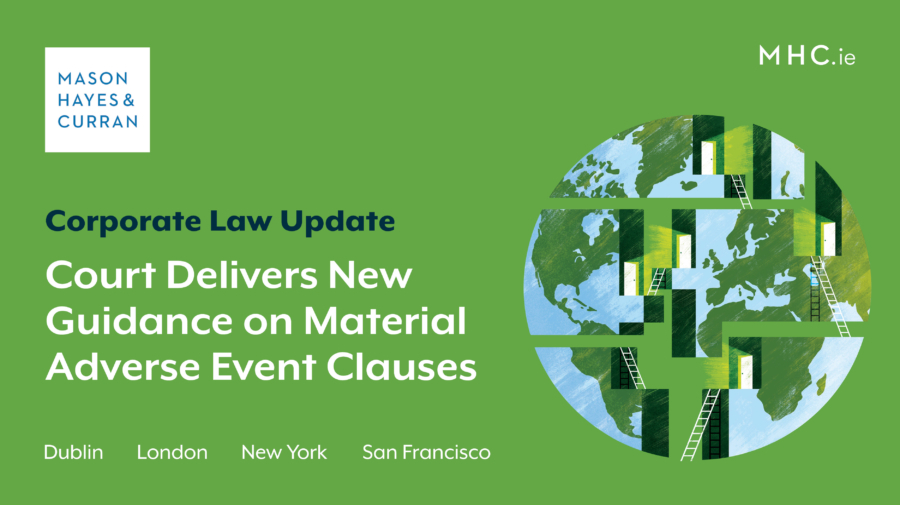Court Delivers New Guidance on Material Adverse Event Clauses

A recent English High Court case provides important guidance on material adverse event / material adverse change clauses in share purchase agreements where there is a split signing and completion. Our Corporate team examines the background to the judgment. The analysis highlights the high bar that a party must meet to walk away from its obligations under a SPA and avoid a claim for wrongful termination of contract.
Split signings and completions are becoming increasingly common in M&A transactions due to the growing number of mandatory consents and regulatory approvals that may be required in order to complete a transaction. A particular area of debate between a buyer and a seller in deals is always who should bear the risk during the interim period. This is the period between signing the share purchase agreement (SPA) and its actual completion.
One key risk allocation mechanism is the use of a material adverse change (MAC) or material adverse event (MAE) clause. A buyer will typically insist that if a material event impacting the value of the target company happens after the signing of the SPA and before completion, it should have the right to terminate the SPA. This would allow the buyer to be discharged from its obligations to complete the share purchase without penalty. The buyer will argue that it should not be obliged to complete the deal where a MAC occurs, as it is no longer getting what it materially contracted to purchase back when the SPA was signed. The seller on the other hand will want certainty that the SPA will complete once signing has occurred. This means that a seller will ideally not want any MAC clause in the SPA at all, or if one is required by the buyer, that it is drafted as narrowly as possible.
Recent case law
A recent judgment of the English High Court delivered in October 2024, provides useful guidance on the interpretation of MAC / MAE clauses. While not binding in Ireland, the findings in this case are likely to be of persuasive authority in the future when a similar matter comes before the Irish courts.
In this case, the buyer and sellers signed two SPAs for the sale of two mines in Brazil with a value exceeding $1 billion. The SPAs had MAE clauses. After signing the SPAs, a geotechnical event occurred at the Santa Rita mine. The geotechnical event caused the displacement of a slope and resulted in cracks appearing on the main ramp of the mine. The buyer argued that the geotechnical event was a material event and that this would allow it to terminate the SPA. The sellers of the mines contested this.
For context, the MAE clause in the relevant SPA read as follows: ““Material Adverse Effect” means any change, event or effect that individually or in the aggregate is or would reasonably be expected to be material and adverse to the business, financial condition, results of operations, the properties, assets, liabilities or operations of the Group Companies, taken as a whole…..”. The full wording of the MAE clause is set out in paragraph 16 of the judgment.
Key aspects of the judgment
The Court ruled that the geotechnical event was not a MAE and that therefore the buyer had wrongfully sought to terminate the SPAs.
The Court set out some useful criteria to help interpret MAC/MAE clauses:
- The normal principles of contractual interpretation apply. The wording used in the MAC/MAE clause itself is key and should always be the starting point of interpretation. A court’s task is to ascertain the objective meaning of the language as drafted by the parties.
- In this case, the language in the MAE condition stated that it was concerned with material matters occurring after signing. This meant that the geotechnical event itself that occurred after signing had to be material.
- “Material” does not mean more than de minimis. It means “significant or substantial”. The words “…would reasonably be expected to be material and adverse…” must be objectively assessed with a higher threshold to be met than merely suggesting that it could be a range of possible outcomes. A mere risk of materiality is not sufficient.
- "Revelatory" events: What may have been revealed to the parties as a consequence of the alleged MAC event, i.e. the geotechnical event in this case, was irrelevant to the extent it related to problems that existed before the SPAs were signed. The fact of the matter was that in this case there was no material change in the underlying geology of the mine after signing. Revelatory changes that occur after signing can only be taken into account to the extent they help “quantify or illuminate the significance” of the alleged MAC event.
- When assessing what is "material", there is no universal "bright-line test" to be applied. What is material will depend on the facts. The court held that all of the following factors were relevant in this case and that they pointed against setting the bar for materiality too low:
- The size of the transaction - here the transaction value was over $1 billion.
- The nature of the assets - the mines were susceptible to geotechnical events by their very nature. The Court also placed weight on the fact that the Santa Rita mine had recorded 166 geotechnical events during the course of 2021. It was also noted that this particular geotechnical event, which the buyers said was a MAE, was “by no means large compared with many geotechnical events occurring in other mines”. The Court heard that “it involved a dislocation, not a detachment, of part of the slope. No one was killed or injured. No equipment was lost. Movement stopped very shortly after the GE. Operations at the Mine resumed on 9 November 2021. The GE was not shown to have had any adverse regulatory consequences.”
- The complexity of the SPAs and the length of the negotiation process were also relevant factors. The Court noted that the SPAs were very large contracts that the parties had devoted considerable time and effort to negotiating before signing.
- The Court referred to the previous case law and concluded that a reduction in equity value of the target company of at least 20% would be material. 15% was potentially sufficient but 10% was likely too low in the circumstances. However, irrespective of the threshold applied, the court decided that the geotechnical event in this case was not material on the facts.
Comment
This case underscores the importance of the facts in determining whether a MAC or MAE event has occurred. Equally critical is the precise wording of the MAC/MAE clause agreed upon by the parties in the SPA that they have already signed up to.
The judgment offers valuable guidance on how courts assess what constitutes "material" when evaluating whether a MAC or MAE clause has been validly triggered. It also highlights the high threshold a buyer must meet to justify walking away from their obligations under the SPA without facing a claim for wrongful termination.
For more information, please contact a member of our Corporate team.
People also ask
What is a material adverse event clause / material adverse change clause in a share purchase agreement? |
A MAC/MAE clause, when validly triggered, is a clause that allows the buyer to walk away from the transaction after it has signed the SPA. MAC/MAE clauses are only relevant where there is a gap in signing and completion. This often arises where some form of consent or approval is needed to close the transaction and this consent or approval can only be obtained after the SPA has been signed. |
How common are material adverse event clauses / material adverse change clauses in share purchase agreements? |
MAC/MAE clauses are only relevant where there is a split signing and completion. Whether a MAE/MAC clause is included in any given SPA or not also depends upon the bargaining power of the buyer and the seller. In a buyer-friendly market, MAE/MAC clauses are more likely to be included in SPAs compared to seller-friendly markets. |
What is the threshold for triggering a material adverse event clause / material adverse change clause? |
This depends upon the specific wording used in the MAC/MAE clause in question that the parties agree to. A seller will want the wording in the MAC/MAE clause to be as narrow as possible, while a buyer will want it to be as wide as possible to give maximum flexibility to terminate the SPA after signing. The wording in the MAC/MAE will be subject to significant negotiation and the final agreed wording will largely depend upon the bargaining power of the parties involved in any given deal. |
The content of this article is provided for information purposes only and does not constitute legal or other advice.
Share this:



